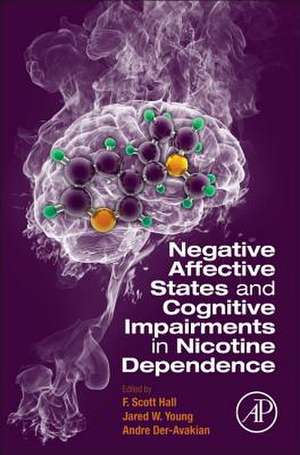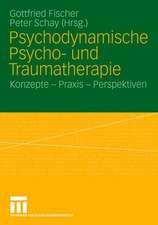Negative Affective States and Cognitive Impairments in Nicotine Dependence
Editat de F. Scott Hall, Jared W. Young, Andre Der-Avakianen Limba Engleză Hardback – 9 sep 2016
The combination of clinical and preclinical approaches to understanding nicotine dependence makes this book an invaluable resource for researchers and practitioners seeking to develop targeted treatments aimed at ameliorating symptoms of nicotine dependence, as well as identifying premorbid differences in affective or cognitive function.
- Provides a unique perspective on nicotine dependence that emphasizes negative reinforcement rather than positive reinforcement
- Examines psychiatric comorbidities and alleviation of withdrawal states as motivation for continued tobacco use
- Includes both clinical and preclinical perspectives
- Includes genetic and multi-neurotransmitter perspectives on nicotine use and withdrawal
- Emphasizes heterogeneity of underlying reasons for smoking, the need for multiple animal models to understand this heterogeneity, and the expectation of heterogeneous responses to potential treatments, underscoring the need for personalized therapeutics
Preț: 515.31 lei
Preț vechi: 669.66 lei
-23% Nou
Puncte Express: 773
Preț estimativ în valută:
98.60€ • 102.96$ • 81.42£
98.60€ • 102.96$ • 81.42£
Carte tipărită la comandă
Livrare economică 08-22 aprilie
Preluare comenzi: 021 569.72.76
Specificații
ISBN-13: 9780128025741
ISBN-10: 0128025743
Pagini: 362
Dimensiuni: 152 x 229 x 25 mm
Greutate: 0.73 kg
Editura: ELSEVIER SCIENCE
ISBN-10: 0128025743
Pagini: 362
Dimensiuni: 152 x 229 x 25 mm
Greutate: 0.73 kg
Editura: ELSEVIER SCIENCE
Public țintă
researchers, clinicians, graduate students, and health professionals in cognitive neuroscience, behavioral neuroscience, pharmacology, psychopathology, and addictionCuprins
1. Overview of Nicotine Withdrawal and Negative Reinforcement (Preclinical).
Olivier George and George F. Koob.
2. Nicotine withdrawal and attentional deficit studies across species: Conflation with attentional dysfunction in psychiatric patients.
Jordy van Enkhuizen and Jared W. Young.
3. Preclinical models of nicotine withdrawal: targeting impaired cognition.
Mohammed Shoaib and F. Scott Hall.
4. Genetic, developmental, and receptor level influences on nicotine withdrawal-associated deficits in learning.
Munir G. Kutlu, Erica Holliday and Thomas J. Gould.
5. Enhanced tobacco use vulnerability in adolescents, females and persons with diabetes.
Joseph A Pipkin, Tiahna Ontiveros and Laura E. O’Dell.
6. Detrimental effects of prenatal exposure to tobacco smoke and nicotine.
Tomasz Schneider.
7. Contribution of mouse genetic models to our understanding of nicotine dependence.
F. Scott Hall, Yosefu Arime, Yasir Saber and Ichiro Sora.
8. Transmitters and receptors in nicotine withdrawal syndrome.
David H. Malin, Andrea N. Anderson and Pilar Goyarzu.
9. The cannabinoid system in nicotine dependence and withdrawal.
Meghan E. Mcilwain, Arpi Minassian, and William Perry.
10. Critical role for brain stress systems in the negative affective state associated with nicotine withdrawal.
Xiaoli Zi, Dawn M. Bruijnzeel, and Adriaan W. Bruijnzeel.
11. The habenula-interpeduncular pathway and nicotine withdrawal.
Christie D. Fowler.
12. A Clinical overview of nicotine dependence and withdrawal.
Mai Frandsen, Mona Thorpe, Saul Shiffman, and Stuart G. Ferguson.
13. Epidemiologic research on the relationship of nicotine dependence to psychiatric and substance use disorders. Kate S. Segal, Hannah Esan, Alyssa R. Burns, and Andrea H. Weinberger.
14. Nicotine and tobacco smoking and withdrawal in schizophrenia.
Karolina Kozak and Tony P. George.
15. Emergent cognitive impairment during early nicotine withdrawal.
Randi M. Schuster and A. Eden Evins.
16. Nicotine and posttraumatic Stress Disorder.
Dean T. Acheson and Daniel E. Glenn.
17. Nicotine withdrawal and depression: Clinical studies – a four-factor model for more accurate characterization.
David G. Gilbert and Michel L. Pergadia.
18. Neuroimaging insights into the multifaceted nature of the nicotine withdrawal syndrome.
Matthew T. Sutherland, Julio A. Yanes, and Elliot A. Stein.
Olivier George and George F. Koob.
2. Nicotine withdrawal and attentional deficit studies across species: Conflation with attentional dysfunction in psychiatric patients.
Jordy van Enkhuizen and Jared W. Young.
3. Preclinical models of nicotine withdrawal: targeting impaired cognition.
Mohammed Shoaib and F. Scott Hall.
4. Genetic, developmental, and receptor level influences on nicotine withdrawal-associated deficits in learning.
Munir G. Kutlu, Erica Holliday and Thomas J. Gould.
5. Enhanced tobacco use vulnerability in adolescents, females and persons with diabetes.
Joseph A Pipkin, Tiahna Ontiveros and Laura E. O’Dell.
6. Detrimental effects of prenatal exposure to tobacco smoke and nicotine.
Tomasz Schneider.
7. Contribution of mouse genetic models to our understanding of nicotine dependence.
F. Scott Hall, Yosefu Arime, Yasir Saber and Ichiro Sora.
8. Transmitters and receptors in nicotine withdrawal syndrome.
David H. Malin, Andrea N. Anderson and Pilar Goyarzu.
9. The cannabinoid system in nicotine dependence and withdrawal.
Meghan E. Mcilwain, Arpi Minassian, and William Perry.
10. Critical role for brain stress systems in the negative affective state associated with nicotine withdrawal.
Xiaoli Zi, Dawn M. Bruijnzeel, and Adriaan W. Bruijnzeel.
11. The habenula-interpeduncular pathway and nicotine withdrawal.
Christie D. Fowler.
12. A Clinical overview of nicotine dependence and withdrawal.
Mai Frandsen, Mona Thorpe, Saul Shiffman, and Stuart G. Ferguson.
13. Epidemiologic research on the relationship of nicotine dependence to psychiatric and substance use disorders. Kate S. Segal, Hannah Esan, Alyssa R. Burns, and Andrea H. Weinberger.
14. Nicotine and tobacco smoking and withdrawal in schizophrenia.
Karolina Kozak and Tony P. George.
15. Emergent cognitive impairment during early nicotine withdrawal.
Randi M. Schuster and A. Eden Evins.
16. Nicotine and posttraumatic Stress Disorder.
Dean T. Acheson and Daniel E. Glenn.
17. Nicotine withdrawal and depression: Clinical studies – a four-factor model for more accurate characterization.
David G. Gilbert and Michel L. Pergadia.
18. Neuroimaging insights into the multifaceted nature of the nicotine withdrawal syndrome.
Matthew T. Sutherland, Julio A. Yanes, and Elliot A. Stein.
Recenzii
"…provides a unique perspective on nicotine dependence from a clinical and preclinical perspective focusing on negative reinforcement rather than positive reinforcement, the role of withdrawal states as motivating for continued use, and genetics and multineurotransmitter effects on use and withdrawal. Score: 83 - 3 Stars" --Doody's


